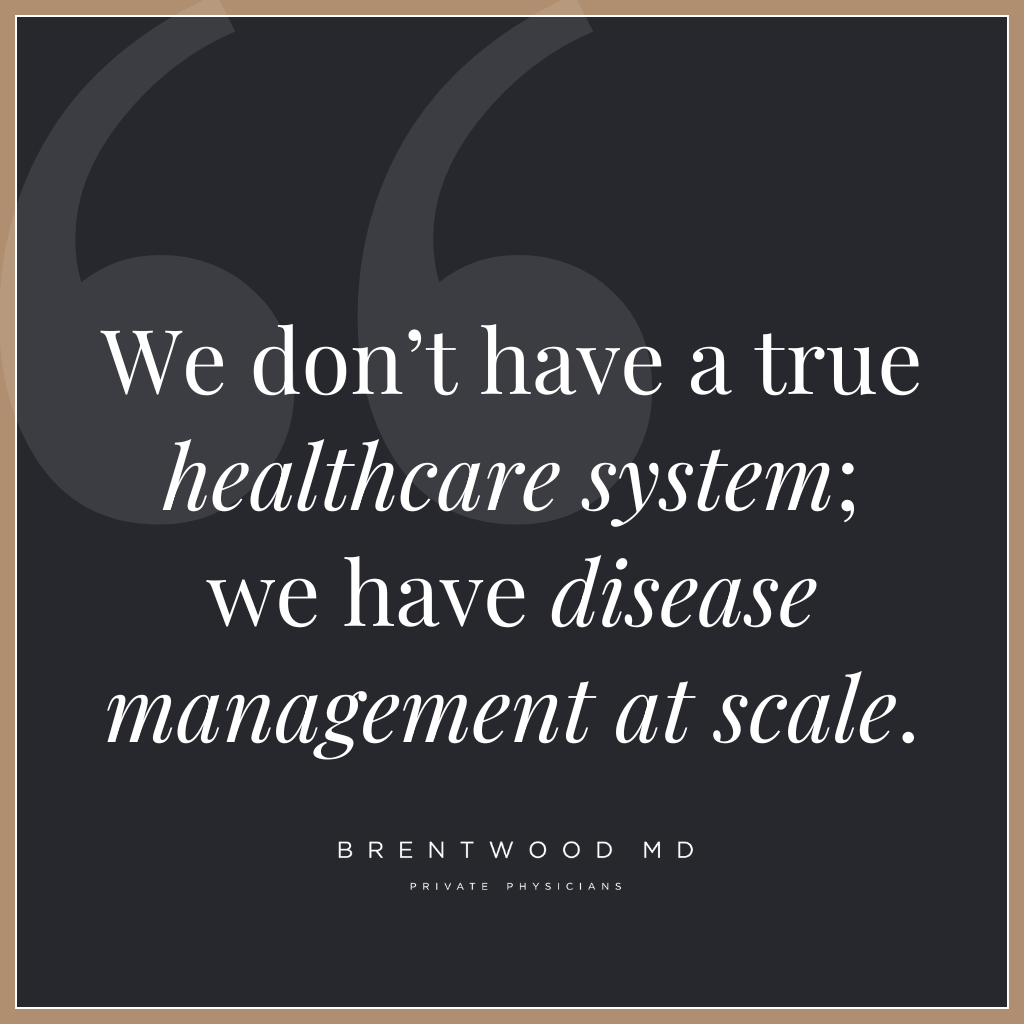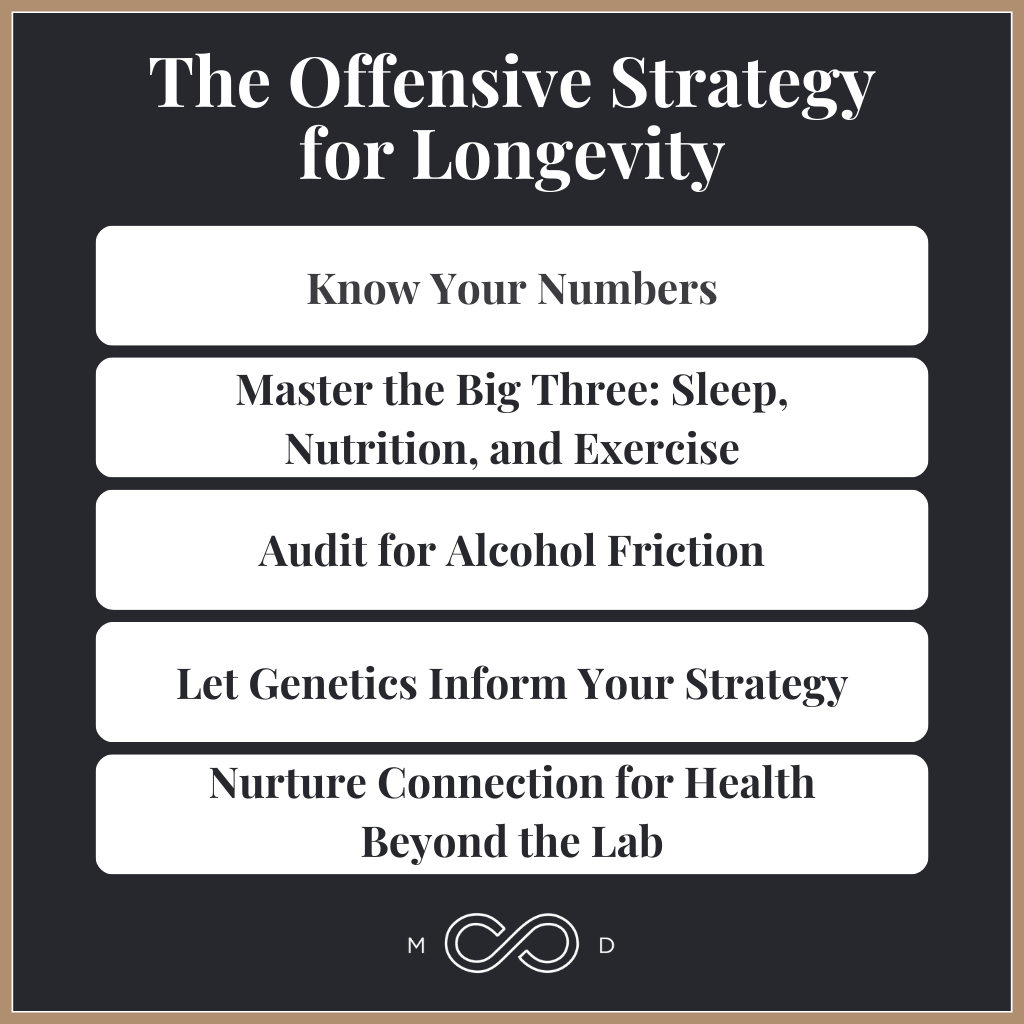Download file | Play in new window | |
Recently, I had the privilege of speaking to a room full of entrepreneurs, creators, and business leaders — people who are relentlessly driven to maximize their potential.
They wanted to know how to live longer while living better.
We talked about my book, 90 Is the New 60, and I shared my thesis: We’ve entered an age where living into your 90s with the vitality of a 60-year-old is no longer science fiction.
If you take ownership of your health.
For most of my career, I didn’t believe that was possible. Like many of my colleagues, I was trained in a sick care model — a system designed to prevent quick death, not to optimize for long life. But once I left that system and began working with highly motivated individuals who wanted to invest in their quality of life, I realized I hadn’t been seeing the whole picture.
The Problem With “Sick Care”
Over the last century, we’ve optimized healthcare to solve for quick death: stab wounds, heart attacks, car accidents, strokes. If you have a life-threatening emergency in the next 30 minutes, the ER is the best place on earth you can be.
But where we’ve failed miserably as a society is managing the slow killers — the diseases that build over decades. Most people don’t get eyes on them until the last five years of life, and by then they’re scrambling. But that’s how our current healthcare model works.
In reality, “healthcare” is a bit of a misnomer. We don’t have a true healthcare system; we have disease management at scale. Sick care. And within the confines of that model, even I couldn’t have imagined living vibrantly to age 90.
The Shift
When I got into private practice and saw high-achieving individuals willing to make changes that would increase their quality and length of life, I started asking myself: If I wanted to help these people live longer and healthier lives, how would I do it?
The answer came from studying the data.
We know exactly what kills humans most frequently. So, I simply reverse-engineered how to avoid or delay most of those top killers.
The striking reality is that seven of the top 10 causes of death in the U.S. are directly or indirectly linked to metabolic disease:
- Heart disease
- Cancer
- Stroke
- Alzheimer’s (increasingly linked to disordered metabolism)
- Diabetes
- Kidney disease
- Liver disease
The key to living longer and feeling better, then, lies in delaying — perhaps even preventing — metabolic disease as long as possible. When we optimize our metabolic health, we dramatically increase the odds of extending both our lifespan and healthspan.
Enemy #1: Metabolic Disease
When I say metabolic disease, what am I talking about?
Metabolism is simply biological energy management, or how your body converts food into usable energy. When this process breaks down — when your system loses efficiency in using, storing, and accessing energy — you have metabolic dysregulation.
That dysregulation leads to conditions like:
- Truncal obesity
- High blood sugar
- High triglycerides
- Insulin resistance
- Fatty liver
- Elevated cholesterol
- Hypertension
- Diabetes
Unfortunately, metabolic disease has already run rampant in the United States. A recent study from UNC-Chapel Hill showed that 88% of U.S. adults have at least one of the metabolic conditions above. Or, said another way, only 12% of Americans are metabolically healthy.
Since metabolic disease is the gateway physiology to all the diseases we most want to avoid, this is a really serious situation — especially if we want to increase longevity.
The good news? Metabolic disease is both reversible and delayable. And, if you delay it long enough, it’s preventable.
The Offensive Strategy for Longevity
To win at longevity, we have to stop playing defense and start playing offense. Largely, this means actively pursuing metabolic health.
I deeply believe this is both possible and achievable. If you do too, you can start by implementing these tools:
1. Know Your Numbers
If you run a business, you can track endless metrics. But knowing which metrics actually matter for the health of your company is what really matters.
The same applies to health. Business has KPIs; I have KHIs — Key Health Indicators.
Data drives decisions. Without it, you’re flying blind. But if everything is important, nothing is. So you need to be clear on which metrics matter most, and lean into those. My book gets into the details, but generally speaking, they tend to be markers around:
- Blood pressure
- Cholesterol
- Blood sugar, including fasting insulin
- Waist circumference
- Hormone balance
- Emotional wellbeing
Normal vs. Optimal: What Your Numbers Tell You
When you get labs drawn, the ranges you’re given to represent “normal” are derived from population statistics like age and gender. But based on what I mentioned about the metabolic health of the U.S. at large, being “normal” (defined as “typical”) amongst a group of metabolically unhealthy individuals may not align with your goals.
Put another way, a 57-year-old male whose cholesterol falls within the population norm wouldn’t raise any red flags, but that doesn’t mean his health is optimal.
With lab work, it’s important to consider your goals. For some tests, the normal range is perfectly fine. For many metabolic markers, however, I would argue that normal is not necessarily optimal if you care about delaying or preventing metabolic disease.
This is a more offensive mindset than the sick care model espouses, which is why it’s so important to find a healthcare team that aligns with your goals. With an aligned team, you can consider your numbers together: What are you trying to achieve? Which metrics most impact that result? Are those numbers normal or optimal?
2. Master the Big Three: Sleep, Nutrition, and Exercise
Of all the tools we have, sleep, nutrition, and exercise move the needle on health and longevity the most.
Sleep: The Silent Multiplier
I used to rank nutrition first in the hierarchy of health multipliers, but the data — and my own experience — have convinced me that sleep edges out nutrition by a photo finish.
We spend a full third of our lives sleeping. That’s how we’re designed, and it signifies a massive level of importance and influence in our lives. Yet sleep is the first thing we steal from to make time for work, workouts, and Netflix.
That’s a huge mistake, and not just because it makes you sleepy the next day. Chronic sleep deprivation wrecks metabolic health, brain function, and emotional resilience over time — all of which you need for longevity that matters.
Nutrition: Eat Like Your Great-Grandparents
As a society, we have a lot of religiosity around food, and a near-infinite number of doctrines and rituals to choose from. To simplify, here’s my 30,000-foot rule:
If it wasn’t food 120 years ago, it’s probably not food now.
The highly processed, “new” foods of today are being sold to you as food, but what are they really? Nutritionally stripped former foods stuffed with added chemicals that your body wasn’t built to process. And they’re everywhere.
The abundance of convenient, accessible, highly processed foods is an enormous driver of our depressing metabolic health statistics. However, prioritizing single-ingredient, whole foods reverses the trend.
If you want an apple, have an apple — not apple juice or apple-flavored candy.
Avoid ultra-processed options that come with 47 unpronounceable ingredients on the label.
When you start adding multiple ingredients — like a snack with 47 items listed on the back — those additions create metabolic friction. In the short term, it won’t kill you, though it may give you indigestion. In the long term, though, eating low-quality food is part of the contributory, sleepy, under-the-radar buildup of metabolic disease.
Exercise: Strength Is Longevity
Finally, we have exercise. I may not place it first in the race, but it comes in just behind the other two.
Exercise is non-negotiable for longevity, with strength training being most crucial. Muscle is metabolically active tissue, burning glucose, regulating insulin, and keeping you moving and functional for decades longer.
The goal of strength training isn’t to become a bodybuilder. (You won’t start bursting with glistening, bulging muscles unless you actively reach for that outcome.) The goal is to build a resilient infrastructure that supports a long, fulfilling life while minimizing risk of injury.
3. Audit for Alcohol Friction
During the talk, I got an excellent question about my thoughts on alcohol.
My guiding principle on alcohol is this: How much friction is alcohol bringing to your life and health?
If you consume alcohol maybe once a month, it probably isn’t causing a lot of friction in your life — assuming we’re not talking a monthly reckless binge.
If you consume alcohol on a weekly or daily basis, however, I suggest taking an honest look at any friction in terms of your goals, values, and belief systems.
The honest truth is, alcohol is a toxin. Your body processes it as a toxin. It has zero nutritional redeeming value.
That said, alcohol works very well. People aren’t reaching for their cocktail of choice for no reason. They’re trying to get from a less ideal state to a perceived better state, often a more relaxed state. But it comes at a cost that many people, including myself at times, underestimate.
The key to evaluating your alcohol consumption is noticing areas where you’re absorbing negative impact. Do your sleep scores drop on the nights you have some wine? Is your weight creeping up even though you eat well otherwise? Is your blood pressure or your fasting glucose a little high?
If you find friction between your health goals and your alcohol intake, then some reduction or modification in this area makes sense. The outcome won’t be the same for everyone. It depends on your individual goals and your unique biology.
4. Let Genetics Inform Your Strategy
In some camps, genetics get all the credit. In others, they get none. The truth is somewhere in between.
If we think about health as a portfolio of assets, genetics bring both risk and reward to the mix. When you understand your genetics, you gain the opportunity to practice proactive risk management.
Genetics aren’t destiny. They’re more like a room with a lightbulb and a lightswitch. Just because that room has a switch doesn’t mean the lightbulb must turn on. An outside force has to act on the switch first.
Similarly, if you have a family history of Alzheimer’s or early cancer, you are at higher risk for developing those diseases. But environment or lifestyle has to flip the switch first.
Since we aren’t always perfect — and we don’t always have control of our environments — knowing our genetic risks also allows us to keep eyes on our relevant numbers. Then, we detect developing disease early enough to treat it most effectively.
5. Nurture Connection for Health Beyond the Lab
When an attendee asked whether I’d choose a perfect diet or amazing relationships if I had to pick, my answer was clear: relationships win.
Humans are wired for connection. Without it, the healthiest body in the world still suffers. If we solve for metabolic disease but forget to attend to our mental health, especially through our relationships with other humans, what are we living longer for?
Final Thoughts
Time is one of the most important assets we have. But I would argue that time without health isn’t all that valuable.
My ambition and hope for you is that you would be curious. What’s one change you could make that would result in both increased time and health down the line?
- One change to your sleep routine.
- One regular whole-food meal.
- One honest conversation with someone you love.
Be curious. Look for the opportunities. Watch for the risk factors. Longevity isn’t about radical overnight transformations. It’s about small, unremarkable investments, made consistently over time.
That’s how portfolios — financial and physical — compound. Investors don’t build wealth by ignoring their numbers, avoiding risk assessments, and hoping for the best. Health works the same way.
Will this get everyone to age 90 in pristine condition? Of course not. Some people will get there, and some will go beyond. Some will get five or 10 additional quality years.
The point isn’t really to hit a specific age, but to add as many high-impact years to the back end of life as possible.
Adding “only” a decade of health to your life isn’t a failure. It’s a huge win, and one you — and your loved ones — will be thankful you fought for.

Dr. Aaron Wenzel is a concierge physician specializing in the care of fast-moving entrepreneurs, executives, and public figures in the Nashville, TN area. Dr. Wenzel’s diverse life experience and extensive training in family medicine, emergency care, nutrition, and hormone replacement therapies give him the unique platform to provide unmatched care for his patients.









